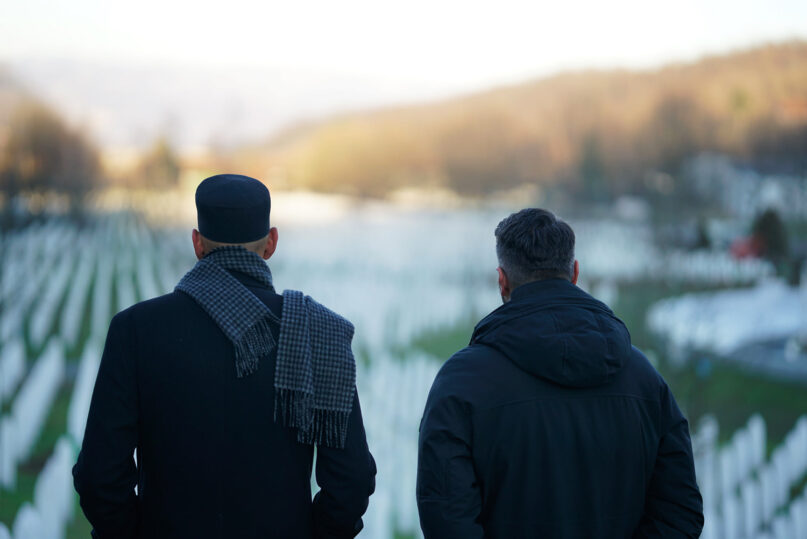(RNS) — The genocide that occurred in Srebrenica 28 years ago this week, when some 8,000 mostly Muslim Bosniaks were killed by a Serbian nationalist militia, was the largest genocide Europe has seen since the Holocaust. It didn’t come out of nowhere: In the three years leading up to this genocide, an estimated 100,000 people were killed, 80% of whom were Bosniaks, one of three ethnic groups that called the fledgling state of Bosnia and Herzegovina home.
But in July 1995, Bosnian Serbs troops slaughtered Srebrenica’s men and boys before burying them in mass graves, raped an untold number of Bosniak women and removed an estimated 23,000 women, children and elderly, putting them on buses and driving them to Muslim-controlled territories.
It was the horrific climax of a disgraceful war. The international Muslim community mobilized, and the shame of the genocide prompted the West to act. A NATO-led bombing campaign led to the cessation of the Serbian murder machine.
On the 28th anniversary of the Srebrenica genocide, how do we reflect on the murder of thousands of Bosniak Muslims in a matter of hours? How do we avoid “statistical numbness,” one where casualty counts, past and present, are merely numbers, absent souls?
The attitudes that allowed a genocide to occur in Srebrenica continue to inform our view of Muslims today. One phenomenon of the genocide that comes through is a dehumanization of the Muslim, apart from race, geography or identity. Despite their location in Europe and their Caucasian identity, Bosniaks were demonized, dehumanized and consequently assigned for slaughter precisely because of their Islam.
Post-World War II decolonization had already normalized the Third World Muslim victim of Africa and Asia, but in Europe itself, only a few decades separated from mass murder of millions of the continent’s Jews, the citizens of the world’s most prosperous region had told themselves they had left the savagery of the past behind. Insert Islam, however, and the Bosniak Muslim is transformed into a natural casualty.
Simply put, would the genocide of Srebrenica have been possible if the victims weren’t Muslim? Or did this prove that being Muslim alone potentially disqualifies one from being considered European or even human?
These questions about Srebrenica are especially relevant in our 21st century, whose futile wars in places like Iraq and Afghanistan have resulted in thousands of unnamed and unknown casualties.
What does it mean to remember? What good is remembering without pause, reflection and internalization? It’s important to frame the genocide of Srebrenica and similar atrocities primarily through the lens of personal accountability. In looking inward while reflecting on atrocity, we properly remember Srebrenica, converting remembrance from a ceremonial annual ritual to a transformative exercise of self-accountability.
When I visited the Srebrenica Memorial Center, I was chilled to the bone by the sheer number of graves, most of them containing bodies of Bosniak Muslims recovered from mass graves. They cover the ground as far as the eye can see. In Srebrenica, the air itself seems to bear witness to the bloodshed. Statistical numbness is impossible. Every grave is important. The difference between one casualty or two, much less 8,000, is the difference between night and day.
At the memorial center, the shoes of the victims remain on display, each pair a reminder that we must humanize the statistic and bring life to the virtual. Every human being who once stood in those shoes had tried to escape the horrific cruelty of the tormentors. The victims thought of ways to run and hide, and dreamed of walking freely without fear. They were children, parents, spouses and siblings. But to those who massacred them, assembly line-style, they were less than insects.
Remembering genocide means remembering that it can only happen with this systematic dehumanization of a people. It doesn’t happen in one day; it takes sustained neglect of a fellow human’s plight. We are inundated with the news of casualties and tragedies every day, on our phones, televisions and computers. Over 10 killed here, 25 killed there. 700 killed there. Without proper remembrance, a cycle of empty condolences and endless anniversaries continues.






